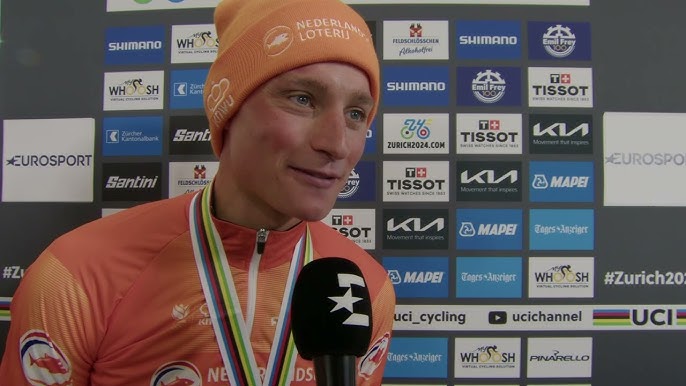After the race, ESPN Presents $25 Million Annual Offer to Mathieu van der Poel
“It’s hard to describe how strong he is,” last year’s world champion Mathieu van der Poel said with a shake of the head just a few minutes after finishing in third place in Zurich this weekend. Tadej Pogačar had just ridden away from the Dutch rider and the rest of the peloton in an attack that lasted just over 100 kilometres.
Van der Poel hadn’t been able to respond, and he was barely able to catch his breath as he spoke to journalists at the finish line. In fact, none of his rivals could. One thousand yard stares, glazed eyes and weathered faces came in dribs and drabs alongside the Zurichsee lake, with riders collapsing off their bikes in exhaustion as the gruelling day came to a close.
This is what Pogačar had done to the very best of them. They were all aware that the attack would come from the Slovenian and yet when it did, they could still do nothing about it. A group made up of the strongest bike riders in the world were unable close the gap of just under one minute as the 26-year-old powered away to rainbows.
“If anyone is surprised that Pogačar won this race then I don’t think they follow cycling,” America’s Quinn Simmons stated after the finish. “I did 7000 kilojoules today, so you tell me if the race was difficult. My teammate Matteo [Jorgenson] told me before the race that he tried to follow Pogačar once and said that ‘when you go too close to the sun you get burnt, and today I got burnt.’”
Was there anything anyone could have done to stop the charging Slovenian as he finessed the corners and punched up the climbs on fast Swiss tarmac?
“There’s always people that are maybe a step or two above the rest, sometimes it’s one guy, sometimes it’s two. Over the years we’ve seen rivalries in the Classics, in the Tours, everywhere,” a dejected fourth place finisher,Toms Skujiņš of Latvia shrugged. “I think everyone expected Remco [Evenepoel] to give Tadej a run for his money but he got caught out a bit napping.”
Some of Pogačar’s rivals argued that his unexpectedly long-range attack was the thing that helped the Slovenian rider take victory. From a mental perspective, the thought of sustaining an effort for such a prolonged period of time seems impossible to most.
“I think it was a pretty tough moment in the race with 100km left to go, everyone was thinking it’s too much to do,” Ireland’s Ben Healy said. “He went, and I don’t think anyone expected it. Then it was the whole Belgian team chasing them down, so I think with 100km left everyone thought it was a bit much, even for Tadej. He proved us wrong again.”
Remco Evenepoel of Belgium agreed with Healy’s sentiment: “Tadej was on a special day, in some races you would say this was easily controlled, but the moment he went, I was saying to Mathieu that it was a suicide move and that everything was going to come back together. In the end, he rode as fast as we did at the back.”
Among those who eventually found themselves in the final chase group behind the Slovenian, the consensus was that once he built his advantage close to a minute, any dreams of bringing Pogačar back were farcical.
“There’s not one guy that can follow Pogačar,” Oscar Onley of Great Britain explained, shaking his head. “I didn’t even know he’d gone, to be honest. It’s just really impressive what he does, today and the whole year. It’s another level.”
There is a sense of acceptance among the peloton that Pogačar is simply better. After his breakthrough silver medal, Australia’s Ben O’Connor stated: “Every single time you turn up to the race there’s someone better than everyone else, that is part and parcel of the sport. It’s the same in tennis as well. You do your best.”
